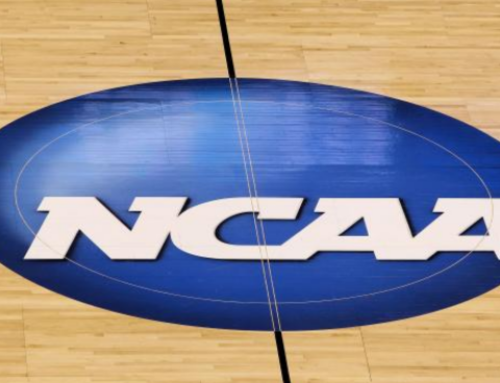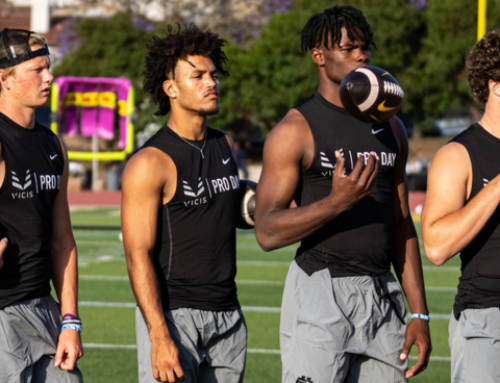Social Media and Recruiting: All Eyes On You

Heads up: Somebody could be watching you.
Your photos on Facebook. Your blog. Those comments on a YouTube video that included some colorful language. People can see that stuff. In fact, the person deciding whether or not you get into school may be looking at it right now.
A study by Kaplan Test Prep found that more than one in every four college admissions officers were using Google and Facebook to find information on prospective students. Of those who did, 35 percent reported finding something that harmed an applicant’s chances of being accepted.
“The percentage of admissions officers using the web to look up students is in the minority,” says Colin Gruenwald, Kaplan’s director of SAT and ACT programs. “But those who do can find a lot more info on you.”
It’s not just people on the academic side who could be digging into your online dirt. More coaches and recruiters are taking to the web to contact—and presumably learn more about—potential student-athletes.
It’s impossible to say how often the contents of one’s social media profiles affect their chances of being recruited or admitted to a school. But it’s clear that, if something is offensive enough, it can derail an athlete who might otherwise be a shoo-in.
For example, In early 2012 highly-touted football recruit Yuri Wright was expelled from Don Bosco Prep for posting sexually explicit and racially charged tweets. Schools that had wanted Wright—including the University of Michigan—suddenly lost interest. Wright eventually signed on at the University of Colorado, but only after his saga created the kind of negative publicity no one wants.
But you can use social media to your advantage, Gruenwald says. He recommends liking the Facebook page of a school that interests you, or the page for the school’s admissions department.
“If you follow a school’s posts and are up-to-date on the news from that school, now you’re an insider,” Gruenwald says. “It shows you’re paying attention. Admissions officers like that.”
Gruenwald’s number one rule: Think before you post.
If you have second thoughts about putting something on the web, don’t—especially if it involves underage drinking, vulgarity, sexuality, plagiarism or illegal activities. Those were all specifically mentioned by admissions officers as things that harmed a student’s chances of admission.
“If you think something is funny and want to tell your friend, tell your friend,” Gruenwald says. “Don’t put it somewhere where it’s going to live forever.”
RECOMMENDED FOR YOU
MOST POPULAR
Social Media and Recruiting: All Eyes On You

Heads up: Somebody could be watching you.
Your photos on Facebook. Your blog. Those comments on a YouTube video that included some colorful language. People can see that stuff. In fact, the person deciding whether or not you get into school may be looking at it right now.
A study by Kaplan Test Prep found that more than one in every four college admissions officers were using Google and Facebook to find information on prospective students. Of those who did, 35 percent reported finding something that harmed an applicant’s chances of being accepted.
“The percentage of admissions officers using the web to look up students is in the minority,” says Colin Gruenwald, Kaplan’s director of SAT and ACT programs. “But those who do can find a lot more info on you.”
It’s not just people on the academic side who could be digging into your online dirt. More coaches and recruiters are taking to the web to contact—and presumably learn more about—potential student-athletes.
It’s impossible to say how often the contents of one’s social media profiles affect their chances of being recruited or admitted to a school. But it’s clear that, if something is offensive enough, it can derail an athlete who might otherwise be a shoo-in.
For example, In early 2012 highly-touted football recruit Yuri Wright was expelled from Don Bosco Prep for posting sexually explicit and racially charged tweets. Schools that had wanted Wright—including the University of Michigan—suddenly lost interest. Wright eventually signed on at the University of Colorado, but only after his saga created the kind of negative publicity no one wants.
But you can use social media to your advantage, Gruenwald says. He recommends liking the Facebook page of a school that interests you, or the page for the school’s admissions department.
“If you follow a school’s posts and are up-to-date on the news from that school, now you’re an insider,” Gruenwald says. “It shows you’re paying attention. Admissions officers like that.”
Gruenwald’s number one rule: Think before you post.
If you have second thoughts about putting something on the web, don’t—especially if it involves underage drinking, vulgarity, sexuality, plagiarism or illegal activities. Those were all specifically mentioned by admissions officers as things that harmed a student’s chances of admission.
“If you think something is funny and want to tell your friend, tell your friend,” Gruenwald says. “Don’t put it somewhere where it’s going to live forever.”
RECOMMENDED FOR YOU
Create A Free Recruiting Profile Today!
CaptainU helps athletes & parents not only be proactive but also to manage and take control of their entire recruiting journey.












